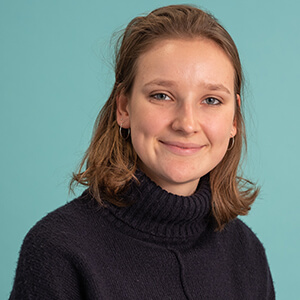I previously studied my MChem at Lancaster University, another campus university in a small town, and so when applying for PhDs Loughborough was an appealing option for me. Although, in the process of looking for a PhD, I considered the project and the supervisors to be the most important thing. I wanted to study a synthetic chemistry PhD with biomedical applications, and so this project was exactly what I was looking for.
Studying a PhD has allowed me to learn about an area I am interested in, to overcome problems in research and improve my confidence in my abilities. Being a chemistry PhD student means around two thirds of my time is spent in the lab, carrying out chemical reactions and analysis. I really enjoy this practical side to my project and find that time goes so quickly when I am in this environment. During this time, I am also able to discuss with other researchers and learn about their projects, which I believe is very beneficial for ensuring that I don’t just focus on my own research area.
I first became interested in studying for a PhD when I did my third-year undergraduate project. This was my first taste of carrying out my own project, and whilst the project itself wasn’t the most interesting to me, I loved the fact that I got to carry it out myself, and that the more time I put into the project the more I got out of it. To help me to decide whether to apply for PhDs, I was lucky to have the opportunity to apply for summer internships at Lancaster; I carried out two projects, one analytical and one synthetic. Alongside conducting my MChem project in my final year, these experiences allowed me to determine kind of research I enjoyed the most, and several other factors, such as I was drawn to more interdisciplinary projects which would allow me to have access to different kinds of chemistry, and I also projects with an application appealed to me.
My research area
The area I’m studying is the Synthesis of Macromolecular Imaging Agents. MRI contrast agents are gadolinium (III) complexes administered to a patient to brighten MRI images. These are used in around 40% of all MRI scans, however, the contrast agents currently used are inefficient and require high dosages to be administered to patients. In my project, the aim is to improve the efficiency of these systems through incorporation of complexes into block copolymer particles. This involves organic synthesis of the contrast agents, and polymer synthesis to generate the block copolymer particles, with work carried out in both Materials and Chemistry departments.
Life as a PhD student
The great thing about being a PhD student is that every day is varied. Some days I might be in the lab 9 am–6 pm, trying to purify a compound I made the day before, some days I might work from home when I have a lot of writing up to do. However, most days I spend some time setting up reactions in the lab in the morning, have a nice break for lunch with the other PhDs in the kitchen, and then in the afternoon take some time to do some analysis and writing up.
The biggest support I receive is from my supervisors, I have one supervisor in Chemistry and one in Materials. We meet weekly to discuss the project progress; they are always available to offer advice and guidance, and being able to show them my work keeps me motivated in the lab! Other PhD students and post-docs have also supported me throughout my PhD, offering advice on staying on top of my data, to demonstrating lab skills.
The future
After the completion of my PhD, I would love to continue to work as a researcher, ideally in a post-doctoral researcher position. During my PhD I feel I have enjoyed the research environment more and more, and find the motivation to complete a project inspiring. In the future, I would like to participate in projects which build on skills I have learnt during my PhD, whilst also introducing new areas of chemistry to allow me to develop as a scientist. Since I have always had an affinity for projects relating to medicine, I would be very excited to work more closely with researchers of biology-related fields which may be able to introduce me to cellular work.
Advice for applicants
My main advice would be to treat your PhD like a 9-5 job, and just keep turning up. During a PhD there are always highs and lows, and during those lows it may sometimes feel like the lack of results will never pass. However, I do believe that if you can manage to detach your worth from the number of results you are getting and commit yourself to treat it like a normal job, your hard work will pay off in the end.
Another thing I have found (for me, anyway!) is that things always take a bit longer than expected to complete, and to begin with I used to get disappointed with myself for this. These days, I realise that some challenges are inevitable, and all you can do is your best.
I have also found that I like writing up my data at the end of some small sections of work, as this gives me perspective on how much I’ve done, any data I’m missing, and keeps me motivated to complete the project.
